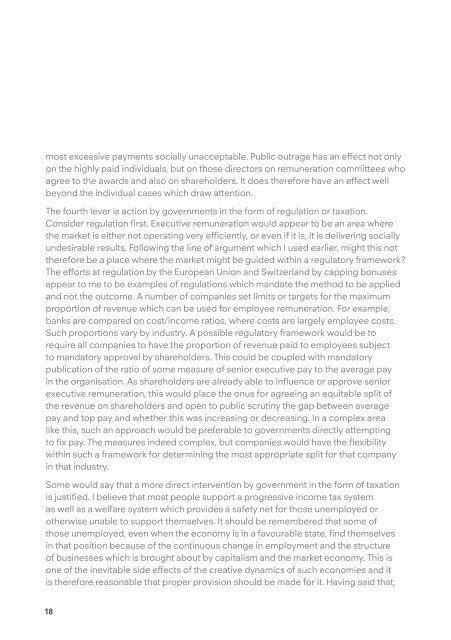Download a .pdf of Sir Mark Moody Stuart's full Beyond ... - Plymouth
Download a .pdf of Sir Mark Moody Stuart's full Beyond ... - Plymouth
Download a .pdf of Sir Mark Moody Stuart's full Beyond ... - Plymouth
You also want an ePaper? Increase the reach of your titles
YUMPU automatically turns print PDFs into web optimized ePapers that Google loves.
most excessive payments socially unacceptable. Public outrage has an effect not onlyon the highly paid individuals, but on those directors on remuneration committees whoagree to the awards and also on shareholders. It does therefore have an effect wellbeyond the individual cases which draw attention.The fourth lever is action by governments in the form <strong>of</strong> regulation or taxation.Consider regulation first. Executive remuneration would appear to be an area wherethe market is either not operating very efficiently, or even if it is, it is delivering sociallyundesirable results. Following the line <strong>of</strong> argument which I used earlier, might this nottherefore be a place where the market might be guided within a regulatory framework?The efforts at regulation by the European Union and Switzerland by capping bonusesappear to me to be examples <strong>of</strong> regulations which mandate the method to be appliedand not the outcome. A number <strong>of</strong> companies set limits or targets for the maximumproportion <strong>of</strong> revenue which can be used for employee remuneration. For example,banks are compared on cost/income ratios, where costs are largely employee costs.Such proportions vary by industry. A possible regulatory framework would be torequire all companies to have the proportion <strong>of</strong> revenue paid to employees subjectto mandatory approval by shareholders. This could be coupled with mandatorypublication <strong>of</strong> the ratio <strong>of</strong> some measure <strong>of</strong> senior executive pay to the average payin the organisation. As shareholders are already able to influence or approve seniorexecutive remuneration, this would place the onus for agreeing an equitable split <strong>of</strong>the revenue on shareholders and open to public scrutiny the gap between averagepay and top pay and whether this was increasing or decreasing. In a complex arealike this, such an approach would be preferable to governments directly attemptingto fix pay. The measures indeed complex, but companies would have the flexibilitywithin such a framework for determining the most appropriate split for that companyin that industry.Some would say that a more direct intervention by government in the form <strong>of</strong> taxationis justified. I believe that most people support a progressive income tax systemas well as a welfare system which provides a safety net for those unemployed orotherwise unable to support themselves. It should be remembered that some <strong>of</strong>those unemployed, even when the economy is in a favourable state, find themselvesin that position because <strong>of</strong> the continuous change in employment and the structure<strong>of</strong> businesses which is brought about by capitalism and the market economy. This isone <strong>of</strong> the inevitable side effects <strong>of</strong> the creative dynamics <strong>of</strong> such economies and itis therefore reasonable that proper provision should be made for it. Having said that,we already have a progressive tax system in which the top one percent <strong>of</strong> taxpayerspay almost a quarter <strong>of</strong> the income tax collected, and the top ten percent pay overhalf <strong>of</strong> the total collected, more than enough to cover the entire welfare bill. Thebalance <strong>of</strong> such issues is best determined by the democratic process, bearing in mindthat excessive or wasteful welfare expenditure is almost as divisive in society as areunjustified excesses <strong>of</strong> remuneration.The difficult issue <strong>of</strong> ensuring that the wealth gap in society is not so large as tocause strains will thus probably have to depend on an interplay <strong>of</strong> shareholder action,leadership by responsible companies and executives, public opinion and perhapsgovernment action if we are to arrive eventually at a stable and sustainable position.In other words, society as a whole will have to arrive at an agreement as to what issocially acceptable.Business needs to work with others in society –capitalism and markets are just mechanismsThat is a theme which has run through this lecture. In the opening lecture <strong>of</strong> this series,I heard Tony Juniper say that capitalism and the market had some role to play asmechanisms in the delivery <strong>of</strong> a more sustainable future, but not in an unadulteratedform. Perhaps surprisingly, I certainly agree that on their own they are not sufficient todeliver a well functioning society. For this we need business, civil society organisationsand others to work together. This is as important for sound business as it is for all <strong>of</strong> usin society.<strong>Plymouth</strong> University is committed to providinginformation in accessible formats.If you require this publication in an alternative formatplease contact:<strong>Plymouth</strong> Business SchoolTel: 01752 585805Email: pbsgateway@plymouth.ac.ukWeb: www.plymouth.ac.uk/pbs18 19
















